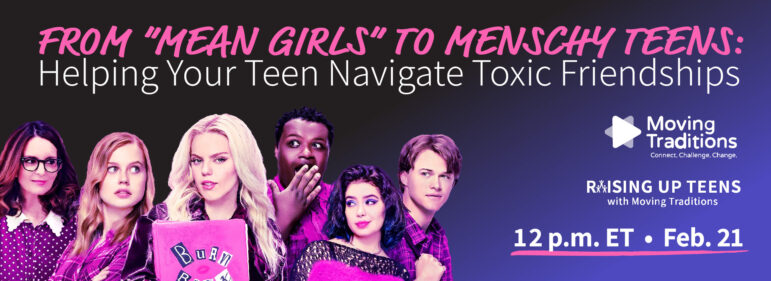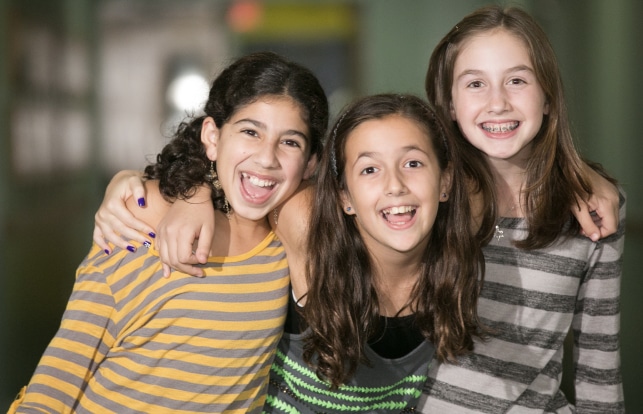
On February 21, Moving Traditions hosted From “Mean Girls” to Menschy Teens, a Raising Up Teens Webinar for parents and educators of Jewish teens. We offer you these actionable takeaways and related resources. This material is adapted from Moving Traditions’ special edition curriculum for educators.
Watching the Webinar Recording
Resources: Watch & Discuss
Watch this song from the Mean Girls musical, which also appears in the new movie, and share it with your teen:
From Mean Girls on Broadway – “I’d Rather Be Me”
In this song, Janice reacts to several friends turning on her. She describes her new secret strategy of being direct with friends instead of being nice and being authentically herself even if it means friends don’t accept her.
Discuss:
- How do the lyrics compare to your experience with friendships?
- What kinds of specific pressures do you perceive in friendships—that may be connected to gender norms or gender socialization?
- In the song, the narrator names her strategy for dealing with pressures on friendships, which involves being assertive. What do you think of this strategy? Have you ever tried it? If so, how did it go? Have you tried something else that was helpful?
A Text Study
We offer you these two texts, one ancient and one contemporary, to reflect on as a parent of a teen – and encourage you to use them to spark meaningful conversation with the teen in your life.
Text 1: Maimonides (Rambam), a 12th century Jewish communal leader and scholar who wrote a commentary on the 2nd century text Pirkei Avot 6:1
There are generally three types of friends: friends you make to achieve a goal, friends you make for enjoyment, and friends who lift one another up for a higher purpose.
Discuss:
- Which type of friend mentioned in the Rambam text is most valuable to you?
- Do you agree there are different types of friends who meet our different needs? Why or why not? Share a personal example.
- Do you think it’s okay to make a friend only to achieve a specific goal, like getting into a new crowd or climbing the social ladder (improving your social status)? Why or why not?
Text 2: Rachel Simmons, Enough As She Is: How to Help Girls Move Beyond Impossible Standards of Success to Live Healthy, Happy, and Fulfilling Lives (2018), excerpt from a book by a contemporary Jewish expert on girls
Part of growing up means realizing no one person can be everything to us. But it’s also true that we may need to be savvy about who we turn to at particular times. Friends can have strengths in certain areas — deep talks, having fun—but not be the one we go to when we need a shoulder to cry on… People give what they can give, they are who they are. If we expect too much, that might be on us.
Discuss:
- What do you think about her advice?
- What do you think about the balance between choosing friends and being chosen by friends?

Support our work
Your gift to Moving Traditions emboldens Jewish youth to thrive through the pursuit of personal wellbeing (shleimut), caring relationships (hesed), and a Jewish and feminist vision of equity and justice (tzedek).


